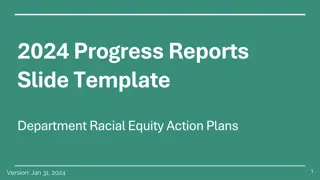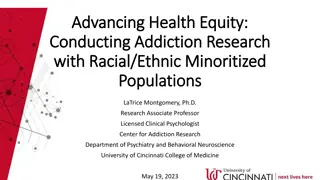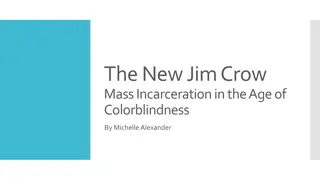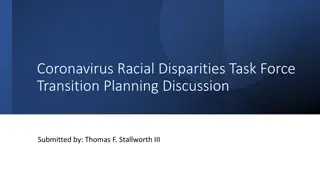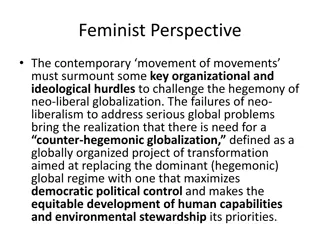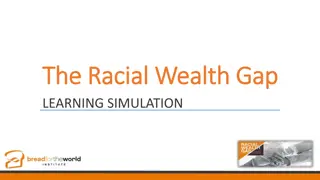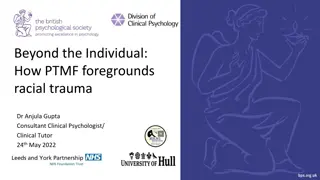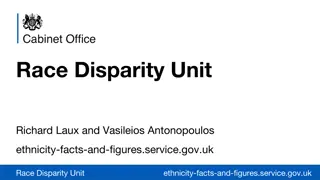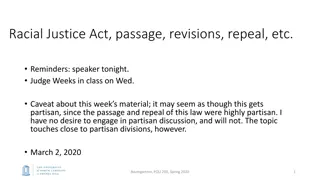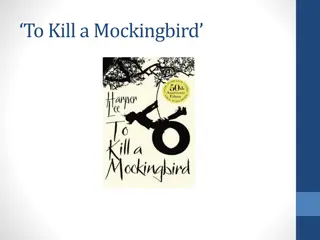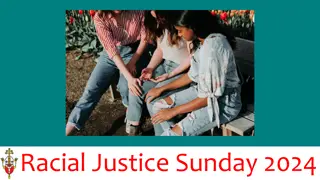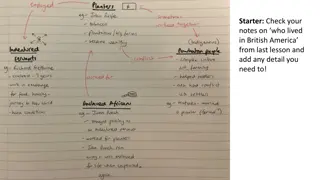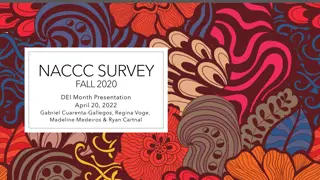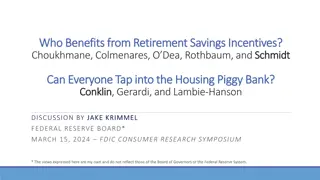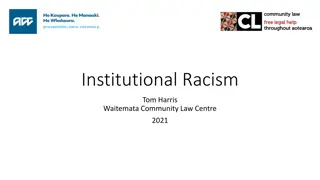Uncovering Racial Disparities and Injustices in Society
Explore the deep-rooted issues of racism, racial disparities, and mass incarceration highlighted by Michelle Alexander's works. Join educational initiatives like antiracism book clubs to understand the historical context and present impact. Discover how the War on Drugs perpetuates systemic inequities, affecting families and communities of color. Reflect on the New Jim Crow system, where marginalized groups are disproportionately targeted and face long-lasting consequences, perpetuating a cycle of discrimination and disenfranchisement.
Download Presentation

Please find below an Image/Link to download the presentation.
The content on the website is provided AS IS for your information and personal use only. It may not be sold, licensed, or shared on other websites without obtaining consent from the author.If you encounter any issues during the download, it is possible that the publisher has removed the file from their server.
You are allowed to download the files provided on this website for personal or commercial use, subject to the condition that they are used lawfully. All files are the property of their respective owners.
The content on the website is provided AS IS for your information and personal use only. It may not be sold, licensed, or shared on other websites without obtaining consent from the author.
E N D
Presentation Transcript
Educate ourselves and practice talking about racism and racial disparities Small Groups/ Peer facilitators Spectrum of learning no endpoint Moving on to intense topics Healing space We have not faced our racial history and cannot tell the truth about our racial present. Michelle Alexander
Turning the Page Antiracism Book Club 2021 Schedule February 9th Part I: A Definition of Terms (Introduction and Chapters 1-2) March 9th Part II: Understanding Blackness in a White Context (Chapters 3-5) April 13th Part III: Understanding Whiteness in a White Context (Chapters 6-7) May 11th Part IV: Beyond Black and White and Breaking the Silence (Chapters 8-10)
The New Jim Crow Mass Incarceration in the Age of Colorblindness By Michelle Alexander
of all people imprisoned for drug offenses have been Black or Latino More African Americans are in prison, jail, or on probation or parole today than were enslaved in 1850 a decade before the beginning of the Civil War. More people are disenfranchised today than 1870 the year the Fifteenth Amendment was signed into law, prohibiting denial of the right to vote based on race The War on Drugs is Racially Defined
A Black child born today is less likely to be raised by both parents than a black child born during slavery A consequence of incarceration, economic and social disenfranchisement, and strain on mental and emotional health Often used as evidence of moral failing and lack of personal responsibility The War on Drugs changes families and communities
The Roundup Police target poor communities of color in drug operations, sweeping large swaths of people into the criminal justice (despite similar drug use across racial lines) Incentivized through grants and drug forfeiture laws Discretion to operate virtually unconstrained in their enforcement (race can be used for target selection) The New Jim Crow Formal Control Denied meaningful representation and coerced into taking plea bargains Prosecutors wield discretion to load up charges Locked up - American drug offenders spend more time in jail or prison than any other country How it Works Invisible Punishment Legally discriminated against for the remainder of their lives Condemned to a permanent undercaste
The Birdcage Image: multiculturalresourcecenter.org
2019 State of Black Kansas City Urban League of Greater KC Black people in KC are 91% more likely to be stopped while driving than white people. White people have a higher rate of contraband hit when stopped.
The meaning of race in America has transformed through each phase of racialized control The Symbolic Production of Race Slavery defined blackness as subhuman and fundamentally subservient to whiteness Jim Crow defined blackness as an inferior, second-class citizenry Mass incarceration defined blackness as being criminal and deserving of being cast aside Each of these erodes the perceived humanity of anyone who is not white
The widespread and mistaken belief that racial animus is necessary for the creation and maintenance of racialized systems of social control is the most important reason that we, as a nation, have remained in deep denial. Absence of Overt Racial Hostility Most Americans have opposed race discrimination since the early 1980s The underpinning of today s racial caste system is racial indifference Well-intended people or people driven predominantly by greed are still capable of participating, knowingly or unknowingly in systems of racial oppression. Americans turn a blind-eye to what has been normalized in our culture prisons are filled with Black men and boys
Current system cannot be tweaked or improved in small ways Prison Economy millions of jobs, rural white communities, major corporations Leavenworth, KS thousands employed by prisons Take a hard look at society s denial of the dangers of colorblindness acknowledge the structures that keep the racial caste system in place. Fixing the system Recognize that the justifications of mass incarceration as a way to control crime are false, and that the system actually creates crime When we recognize each others humanity, we understand the core need for equal human rights
Accountability for racial profiling Allow Governor to withhold funds from law enforcement agencies that show patterns of racial profiling in their annual Vehicle Stops Reports. MO legislature Amend SB 1053 Urban League of Greater KC Bail Reform Address the poverty penalty of cash bail and the discrimination against Black people, who are treated more severely by judges who set bail. Legal Aid Society, ACLU, MO and KS Bar Associations should work with local and state policy makers to implement reform. Focus Areas
Honor Confidentiality Small Groups Choose courage over comfort Regard feedback as a generous gesture that should always be met with gratitude
1. What stands out to you from the reading or todays presentation? Did anything challenge your beliefs about race, racial progress, and our criminal justice system? 2. How do we use the concepts of personal responsibility and choice to justify mass incarceration? How is this similar to the way we explain racial health disparities? Discussion Questions 3. What comes up for you when the author says that mass incarceration has defined blackness as being criminal and deserving of being cast aside? 4. What have you learned through reading and discussing this book? What do you feel like you need to learn more about?


